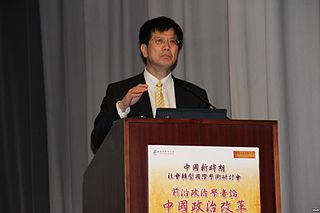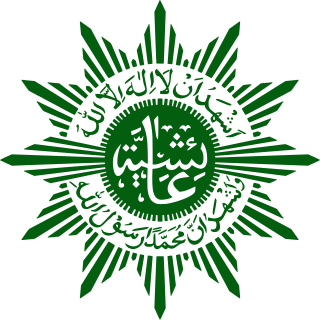Related Research Articles
Islamism is a religio-political ideology. The advocates of Islamism, also known as "al-Islamiyyun", are dedicated to realizing their ideological interpretation of Islam within the context of the state or society. The majority of them are affiliated with Islamic institutions or social mobilization movements, often designated as "al-harakat al-Islamiyyah." Islamists emphasize the implementation of sharia, pan-Islamic political unity, the creation of Islamic states,, and rejection of non-Muslim influences—particularly Western or universal economic, military, political, social, or cultural.

The Society of the Muslim Brothers, better known as the Muslim Brotherhood is a transnational Sunni Islamist organization founded in Egypt by Islamic scholar and schoolteacher Hassan al-Banna in 1928. Al-Banna's teachings spread far beyond Egypt, influencing today various Islamist movements from charitable organizations to political parties.
Sharia is a body of religious law that forms a part of the Islamic tradition based on scriptures of Islam, particularly the Quran and hadith. In Arabic, the term sharīʿah refers to God's immutable divine law and this referencing is contrasted with fiqh, which refers to its interpretations by Islamic scholars. Fiqh, practical application side of sharia in a sense, was elaborated over the centuries by legal opinions issued by qualified jurists and sharia has never been the sole valid legal system in Islam historically; it has always been used alongside customary law from the beginning, and applied in courts by ruler-appointed judges, integrated with various economic, criminal and administrative laws issued by Muslim rulers.
Political aspects of Islam are derived from the Quran, ḥadīth literature, and sunnah, the history of Islam, and elements of political movements outside Islam. Traditional political concepts in Islam include leadership by elected or selected successors to Muhammad, known as Caliphs in Sunnī Islam and Imams in Shīʿa Islam; the importance of following the Islamic law (sharīʿa); the duty of rulers to seek consultation (shūrā) from their subjects; and the importance of rebuking unjust rulers.

Pan-Islamism is a political movement which advocates the unity of Muslims under one Islamic country or state – often a caliphate – or an international organization with Islamic principles. Pan-Islamism was promoted by the Ottoman empire during the last quarter of 19th century by Sultan Abdul-Hamid II for the purpose of combating the process of westernization and fostering the unification of Islam.

Islam is the largest religion in Indonesia, with 87% of the Indonesian population identifying themselves as Muslims, based on civil registry data in 2022. In terms of denomination, the overwhelming majority are Sunni Muslims; the Pew Research Center estimates them as comprising ~99% of the country's Muslim population in 2011, with the remaining 1% being Shia who are concentrated around Jakarta and about 400,000 Ahmadi as well. Indonesia is the most populous Muslim-majority country.
There exist a number of perspectives on the relationship of Islam and democracy among Islamic political theorists, the general Muslim public, and Western authors.
An Islamic state has a form of government based on sharia law. As a term, it has been used to describe various historical polities and theories of governance in the Islamic world. As a translation of the Arabic term dawlah islāmiyyah it refers to a modern notion associated with political Islam (Islamism). Notable examples of historical Islamic states include the state of Medina, established by the Islamic prophet Muhammad, and the Arab caliphate which continued under his successors and the Umayyads.

Reformasi is a political movement in Malaysia. It was initiated in September 1998 by Anwar Ibrahim, former Deputy Prime Minister of Malaysia, after he was sacked from his position by Malaysia's then-Prime Minister, Mahathir Mohamad. The movement, which began while the country hosted the Commonwealth Games, initially demanded the resignation of Malaysia's then-Prime Minister, Mahathir Mohamad, and for the end of the Barisan Nasional-led (BN) government. It later became a reformist movement demanding social equality and social justice in Malaysia. The movement consisted of civil disobedience, demonstrations, sit-ins, rioting, occupations and online activism.

Sarekat Islam or Syarikat Islam was an Indonesian socio-political organization founded at the beginning of the 20th century during the Dutch colonial era. Initially, SI served as a cooperative of Muslim Javanese batik traders to compete with the Chinese-Indonesian big traders. From there, SI rapidly evolved into a nationalist political organization that demanded self-governance against the Dutch colonial regime and gained wide popular support. SI was especially active during the 1910s and the early 1920s. By 1916, it claimed 80 branches with a total membership of around 350,000.
Louay M. Safi is a Syrian-American, a scholar of Islam and the Middle East, and an advocate of Arab and Muslim American rights. He published on such issues as social and political development, modernization, democracy, human rights, and Islam and Modernity. He is the author of 11 books and numerous papers, and speaker on questions of leadership, democracy, Islam, and the Middle East. He is also a spokesperson for the Syrian National Coalition, a league of Syrian opposition groups fighting Syrian President Assad, which was formed in November 2012 in Doha, Qatar.

Ash Center for Democratic Governance and Innovation, formerly known as the Ash Institute, was established in 2003 and is part of the Harvard Kennedy School at Harvard University in Cambridge, Massachusetts, in the United States.

Yu Keping is the Director of the Center for Chinese Government Innovations at Peking University. He is a noted scholar having produced many noted books including the widely noted Democracy is a Good Thing. In addition to his academic work he has also acted as an advisor on political reforms to the Chinese government.
Islamic extremism in Egypt caused terrorism and controversy in the country in the 20th century and continues to be a main issue in the 21st century Egyptian society. Egypt has a long history of radical and extreme sects of Islam with roots dating back to around 660 CE. Islamic extremism opposes "democracy, the rule of law, individual liberty and mutual respect and tolerance of different faiths and beliefs". These extreme beliefs led to radical actions across the Middle East. The main conflict between Islamic extremists and the government officials throughout history stems from two major issues: "the formation of the modern nation-state and the political and cultural debate over its ideological direction".

Aisyiyah is an Islamic non-governmental organization in Indonesia dedicated to female empowerment and charitable work. It was formed on 19 May 1917 by Nyai Ahmad Dahlan to facilitate women's access to education, health care and social services. The organization provides micro-loan and small business development support, family planning services, maternal and pediatric care, orphanages, training for female Muslim clerics, and standard preschool through university level education. These social services end at death, whereby the organization provides female morticians so that female bodies do not need to be prepared for burial by men. Aisyiyah manages several hundred healthcare centers in Indonesia as well as three branches in Egypt, Malaysia and the Netherlands. The organization's stated goal is to make Islamic society a reality for women, and it encourages its members to seek further education even if they become "smarter than their husbands."
Shadi Hamid is an American author and political scientist, who is currently a columnist and member of the Editorial Board at The Washington Post. Previously, he was a longtime senior fellow at the Brookings Institution and a contributing writer at The Atlantic. He also holds the position of research professor of Islamic studies at Fuller Seminary. This appointment is the first time a Muslim scholar has been hired in the school's history. He has been called a "prominent thinker on religion and politics" in the New York Times and was named as one of "The world's top 50 thinkers" in 2019 by Prospect Magazine. He is known for coining the phrase "Islamic exceptionalism" to describe Islam's resistance to secularization and outsized role in public life. The phrase has come under some criticism.
Siti Chamamah Soeratno is a female Islamic scholar from Indonesia and the former leader of Aisyiyah, Indonesia's first all-female Muslim organization. She is also the former dean of Muhammadiyah University of Malang and an expert on Indonesian literature. She has served as a faculty member at Leiden University, Mercu Buana University, Sebelas Maret University and Yogyakarta State University among others.
Post-Islamism is a neologism in political science, the definition and applicability of which is disputed. Asef Bayat and Olivier Roy are among the main architects of the idea.
In the context of Muslim society in Indonesia, Modernism or modernist Islam refers to a religious movement which puts emphasis on teachings purely derived from the Islamic religious scriptures, the Qur'an and Hadith. Modernism is often contrasted with traditionalism, which upholds ulama-based and syncretic vernacular traditions. Modernism is inspired by reformism during the late-19th to early 20th century based in the Middle East, such as the Islamic modernist, Salafiyya and Wahhabi movements. Throughout the history of contemporary Muslim Indonesia, these movements have inspired various religious organizations; from the mass organization Muhammadiyah (1912), political party Masyumi Party (1943), to missionary organization Indonesian Islamic Dawah Council (1967).
References
- ↑ Islam and Democracy: Two Expressions of Islam in Contemporary Indonesia at the John F. Kennedy School of Government. Accessed 22 December 2016.
- ↑ Islam and Democracy: Two Expressions of Islam in Contemporary Indonesia at the Ash Center for Democratic Governance and Innovation. Accessed 22 December 2016.
- ↑ Robert W. Hefner and Patricia Horvatich, Islam in an Era of Nation-States: Politics and Religious Renewal in Muslim Southeast Asia, pg. 96. Honolulu: University of Hawaii Press, 1997. ISBN 9780824819576
- ↑ R. William Liddle, The Islamic Turn in Indonesia: A Political Explanation. Taken from Religion, Globalization and Political Culture in the Third World, pg. 117. Ed. Jeff Haynes. London: Macmillan Publishers, 1999. ISBN 9781349270385